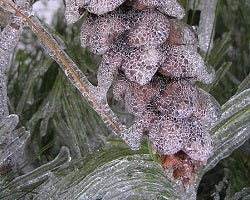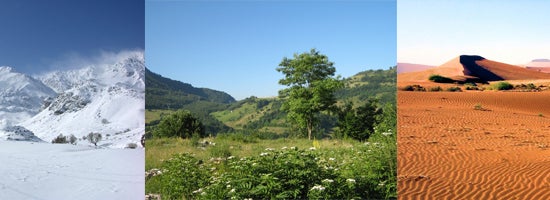Hot Pockets

Have you ever stood out barefoot on the concrete in the summer heat? Your first step doesn’t feel so bad, but after a few minutes it feels like your feet are melting into the sidewalk. That’s because the temperature that your feet can handle depends on whether you will experience it for five seconds or five minutes. In other words, the duration of exposure is just as important as the temperature itself.
This idea is important for building mechanistic models, because sometimes environments become very hot or very cold for short periods of time. Just because an animal can’t tolerate a temperature for a long period doesn’t mean that it can’t tolerate this temperature for shorter periods. Similarly, just because an animal can tolerate the average temperature of a habitat doesn’t mean that it can tolerate the extreme highs or lows.
Exploring the amounts of time that animals can tolerate certain temperatures enables scientists to create more detailed pictures of the conditions that a species needs to survive. And, when predicting how animals will react to climate change, scientists need to consider whether animals will experience the highest and lowest temperatures in their environments for longer or shorter periods.

Additional images are from Wikimedia. Barefoot image by Yarkoski1012.
Read more about: Mapping the Future
Bibliographic details:
- Article: Hot Pockets
- Author(s): Dr. Biology
- Publisher: Arizona State University School of Life Sciences Ask A Biologist
- Site name: ASU - Ask A Biologist
- Date published:
- Date accessed:
- Link: https://askabiologist.asu.edu/hot-pockets
APA Style
Dr. Biology. (). Hot Pockets. ASU - Ask A Biologist. Retrieved from https://askabiologist.asu.edu/hot-pockets
Chicago Manual of Style
Dr. Biology. "Hot Pockets". ASU - Ask A Biologist. . https://askabiologist.asu.edu/hot-pockets
Dr. Biology. "Hot Pockets". ASU - Ask A Biologist. . ASU - Ask A Biologist, Web. https://askabiologist.asu.edu/hot-pockets
MLA 2017 Style

Try walking on a concrete when it is a hot day. One step might not seem too bad, but soon you notice it is like walking on hot coals - blisters and all.
Be Part of
Ask A Biologist
By volunteering, or simply sending us feedback on the site. Scientists, teachers, writers, illustrators, and translators are all important to the program. If you are interested in helping with the website we have a Volunteers page to get the process started.

